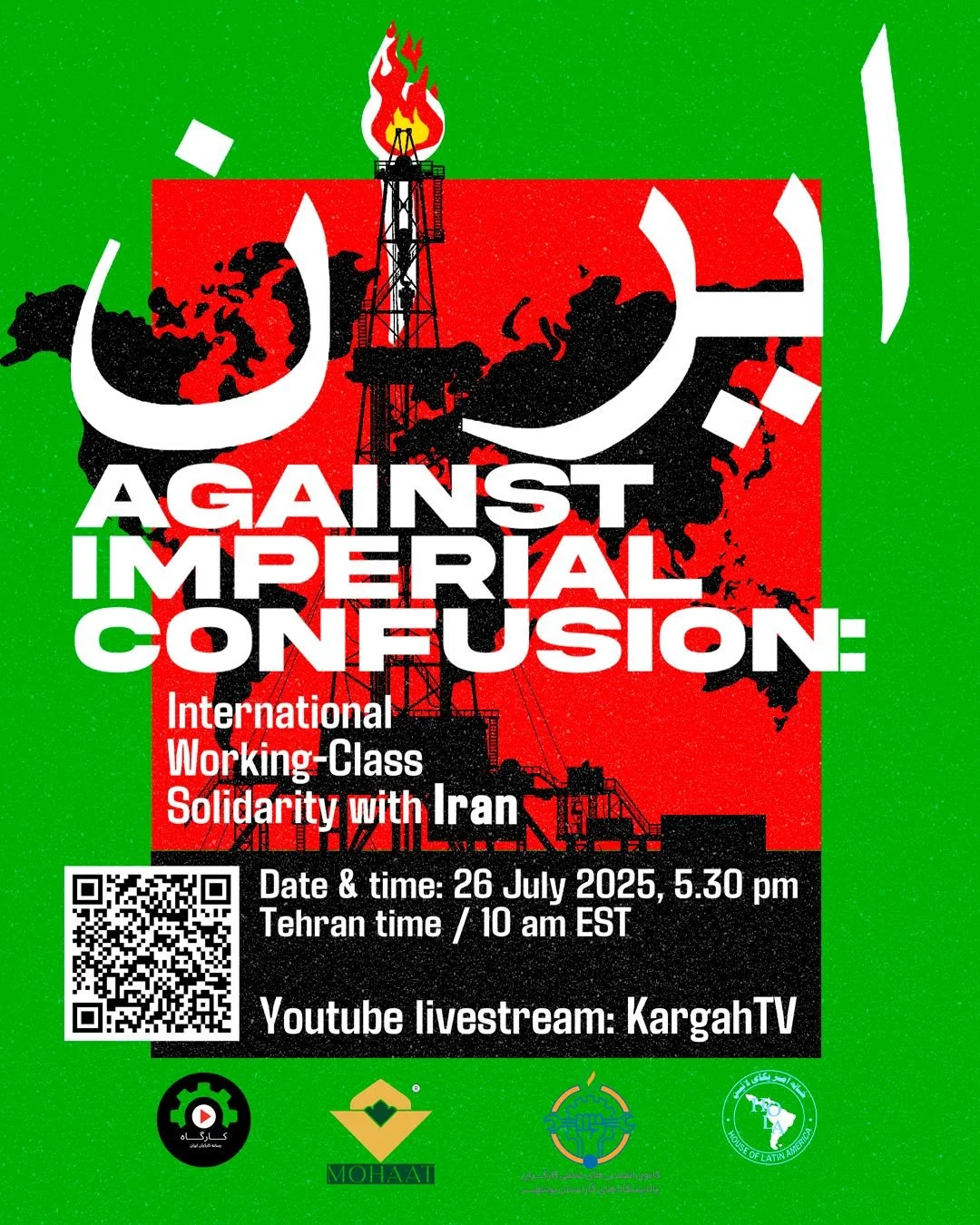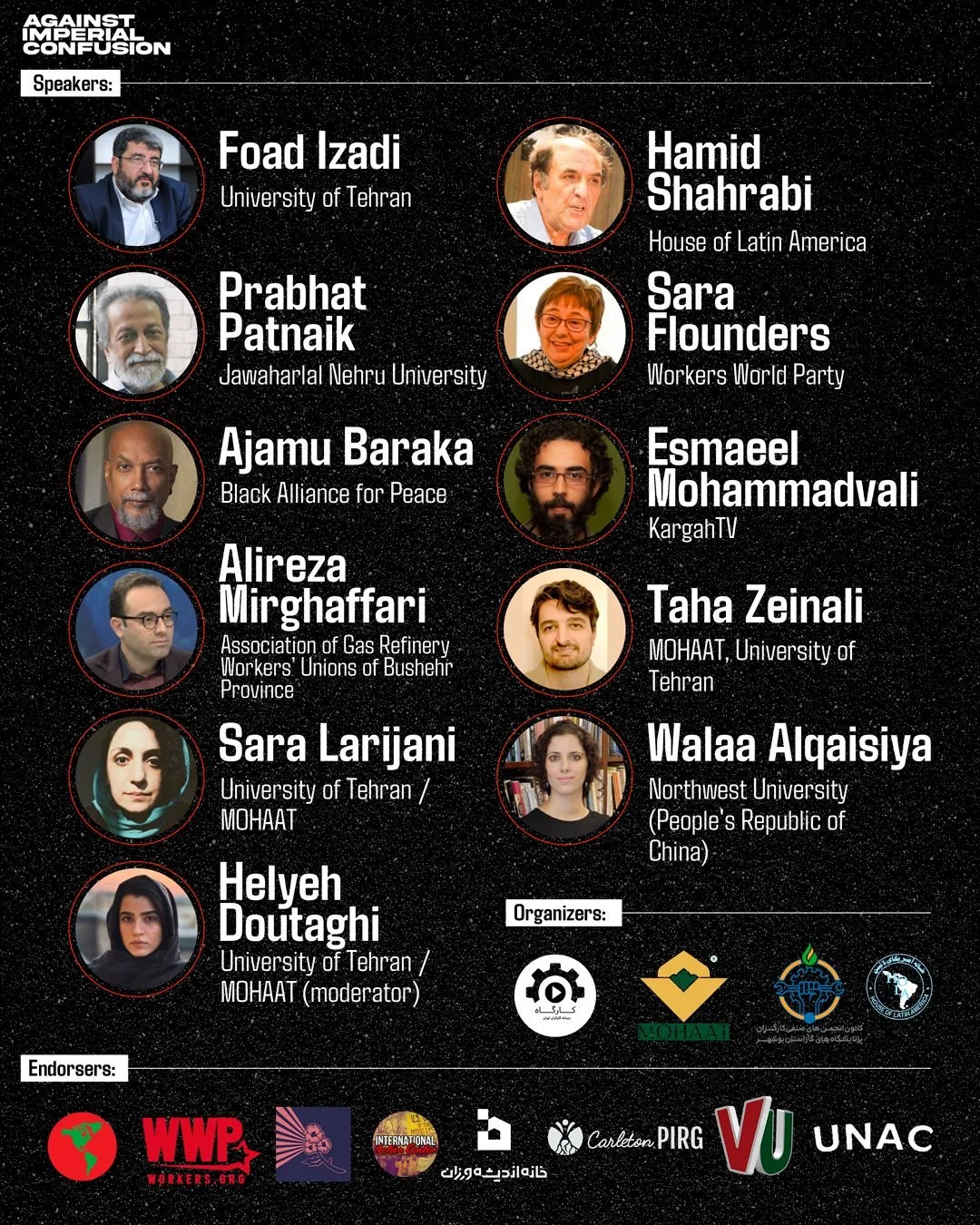Teach-In Against Imperial Confusion:International Working-Class Solidarity with Iran
Duration: 2 hours // Date: Saturday, July 26th at 10 am EST – Zoom
Zoom Link: https://us06web.zoom.us/webinar/register/WN_pMMfuJVjSWGrHcuVRkdoxA
Youtube live: KargahTV
Format:
Hour 1 – Grounded Perspectives from Iran: featuring labour movement leaders, educators, and grassroots organizers
Hour 2 – Principled Solidarity and Internationalism: Featuring International movement leaders, organizers, and scholars from the Global North and Global South
In the wake of the Zionist latest escalation—expanding its war crimes while continuing the genocide in Gaza—Iran was subjected to sustained acts of military aggression by both Israel and the United States. Over 12 days, Iran’s sovereignty was violated through strikes that violated foundational principles of international law and international humanitarian law. These attacks, which were partly meant to disarm Iran’s defense capability, also targeted civilian academics, scientists, inmates, social workers, children, women and industrial workers, particularly those in sectors already devastated by decades of sanctions and imperial de-development.
Over the 12 days, the Iranian people exhibited significant national solidarity. Specifically, the working class demonstrated remarkable collective resolve by sustaining the country's essential production, transportation, and distribution capabilities. This commitment was exemplified by workers at Iran’s South Pars gas field, who intensified their working hours to restore normal production levels following targeted bombing of the refinery (the President of the labour union of this field will be speaking). Although isolated instances of shopping concerns occurred, the broader population largely refrained from stockpiling, a stability directly attributable to the dedication of the workforce in maintaining vital supply chains. People experienced warm welcomes in shops, neighborhoods, on the streets, and in other cities they fled to. Many, especially the youth, expressed their support of Iran’s armed forces, Basij (Organization for Mobilization of the Oppressed) and government bodies.
The experiences of unity significantly altered perceptions, both domestically and internationally, concerning the Iranian peoples, the state, and the fundamental nature of their relationship. It stood in marked contrast to a more recent, mainstream, perception arising during the Woman, Life Freedom movement, which suggested that the Iranian people predominantly seek a Western liberal lifestyle, fundamentally disidentify with their government, and prioritize regime change above national sovereignty. If this latter perception was not entirely dismantled by the images and realities transmitted during the 12-day conflict, it was substantially fractured.
In response to the military aggression against Iran, broad-based movements across the world voiced support for Iran’s right to self-defense. Yet, we once again witnessed a familiar pattern of manufactured political confusion in the imperial core societies. Led by liberal intelligentsia who claim to speak in the name of “nuance”, the liberal left, and even some elements of the uninformed working class reproduced narratives that insisted on distancing solidarity from the very forces defending Iran’s sovereignty, falsely equated Iranian state with its aggressors, offering conditioned solidarity, reproducing both-sides narratives, and elevating native informants’ narratives detached from any grassroots legitimacy inside the country.
Featuring prominent labour organizers from Iran’s South Pars gas refinery union, alongside Iranian educators and journalists, this teach-in centres on the analyses and lived experiences of anti-imperialist Iranians during the 12-day US-Zionist aggression on Iran, particularly highlighting the resilience and critical role of the working class during the conflict. The event progresses into a conversation between anti-imperialist scholars and organizers from Iran and their international counterparts. They confront ideological distortions prevalent in the West by grounding their critique in these concrete Iranian experiences and a South centered epistemological lens. Crucially, the teach-in challenges selective solidarities by foregrounding the struggles and unity demonstrated by Iran's workers and people, seeking to reaffirm anti-imperialist clarity and the indispensable role of working-class resistance against imperialism.



